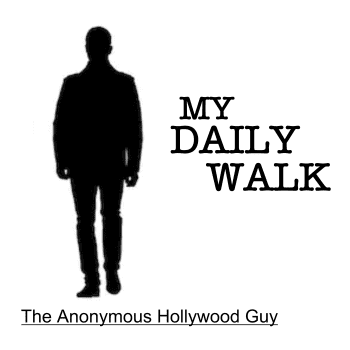My Daily Walk – Meet The Author

My Daily Walk is a podcast with a Holywood personality who records a podcast when he goes for a walk. Meet The Author, if you buy in and what they have written is true, then, it stands to reason that you will get to meet the authors, every one of them, those who adhere to such a belief is there will be a time when, whether it’s heaven, whatever that means.
No way. No way. No way. No way. No way. There was no way that’s true. That’s one of my reactions to a book I’m reading that purports to be true. It purports to be autobiographical. There are some who contend that the claimed author wasn’t the actual author, which makes me want to meet the author to find out. Good morning and welcome to my daily walk. Insert prescriptive intro here. I don’t have a prescriptive intro, but I’m working on one as we go.
This is the daily half-hour podcast of an anonymous Hollywood guy on his daily walk, the daily walk and talk. I’m got to come up with some kind of catch phrase that rolls off the tongue. Anyway, we’ve made it to Friday of the first week. Hurray, celebrations all around.
It is still a work in progress obviously. Let me just begin right here by saying, eventually, I want this to become somewhat of a dialogue if you are listening. If you’ve come this far already and your interest is piqued, I’ve covered some topics or touched on some topics that interest you, please, email me at [email protected]. I didn’t have that email address on Monday, and I do now. Well, I haven’t tested it yet. I received a confirmation email that that email address was set up yesterday. I got that email yesterday. Got to set it up, make sure to test it all that today, tomorrow so that by the time you hear this, it’ll be up and running. Again, email me at [email protected].
One of the things I need to be more conscious of is my breathing. Since this is unedited, it’s an extemporaneous half-hour soliloquy, monologue, talking to my recording device as I walk around and reflect upon everything, everything in the known universe. No, I’m talking about topics. If they interest you, great. I’m going to get in the habit of listing the upcoming topics, already have next week all scheduled out.
I don’t remember what order they’re in. See if I can remember any of the topics for next week. I’ve got the following week already scheduled as well. Next week, I will hit upon … Oh, no, that’s the following week. What? Tease. Maybe, I’ll remember by the end of this recording what the topics are for next week. Note to self, read over my notes before I begin this extemporaneous podcast so that I can tease upcoming topics there. That will be an upcoming topic.
Actually, I think that is one of the topics for next week is discussing the nature of this project, what I’m doing, why I’m doing it and particularly why I’m not disclosing certain details. All right. Well, this is a rough start for the Friday. I’ve just babbled and rambled. At least, I did get the email address out. If you’re going to turn it off now, at least, go and email me and say, “It’s crap. Don’t waste your time.”
But by the end of today, I will have two and a half hours of original content in the can as they say in Hollywood speak. Well, as they used to say because I don’t use cans anymore. Now, here’s a tangent. I remember when they used to bring tape into the office and have it loaded into the machine. Now, they just … Well, they’ll either give you drives or these tiny little chips, these little SD cards. I mean the technology has advanced so much or they just upload it, upload it from wherever they’re shooting. Having something in the can, it doesn’t really make any sense today. But it’s how language works.
That’s one of the topics for next week. Actually, it’s the Monday topic. See, I knew I would remember. Monday’s topic has to do with language and how words enter the common vernacular and ultimately the dictionary. Language is always evolving and changing. Words have meaning that they are injected with and that changes over time. Some new meetings are added and old meanings fall away and become archaic. Anyway, that’s Monday, not today.
One of the other features of my daily walk, there’s the breathing again. I’ve got to stop breathing into the microphone so that you don’t get annoyed by my constant breathiness. I am on a walk. I am talking, so I will get out of breath. But I know it’s somewhat annoying if you have to listen to a person always inhaling, exhaling, sighing. I’ll do my best because it’s unedited. That stuff would normally be taken out of the audio.
But if you don’t like it, you’re not listening anyway after a week of it. But for those of you who are sticking with it, I will increasingly become hopefully better at it, not breathing straight into the mic. One of the other futures is I will review the previous day’s topic briefly before I launch into today’s topic. Yesterday, I couldn’t even remember. Gosh, that’s another note to self. Review not only the upcoming topics but the previous day’s topic. What was it?
Monday was the voices in your head. Tuesday was bad. This is bad. Maybe, it’s good. This is extemporaneous, and you’ll see how my mind works or doesn’t. What the heck did I talk about yesterday?
Oh, I finished early, a little bit early because I was talking … It’s the Aristotle quote. Whoa. It took me a whole, what, 30 seconds, 20 seconds to remember what I talked about yesterday. The well begun is half done. I noted that Aristotle didn’t say that because Aristotle didn’t speak English. It’s nice that, in English, it rolls off the tongue poetically. I have no idea how it rolled off the tongue in the original Aristotle’s native tongue, Greek, I guess. Well begun is half done and moved on to it’s not how you start, it’s how you finish, and how those two concepts are related and unrelated.
I thought it was interesting discussion, some spontaneous thought there. I don’t think it’s possible to exhaust a topic. You could talk about any given thing and go in any direction forever. Maybe, that’s hyperbole forever, but what has happened, what will happen occasionally, I don’t know how often is, I will feel pressed for time as I look at the clock ticking down to the end of the episode. I won’t be able to cover everything I wanted to cover yesterday if you like.
I actually got more in than I was expecting. Some topics are that way. Today’s topic maybe that way, I looked at the title. What I wrote down was meeting the author, and I actually am not sure exactly what I was thinking when I first wrote it down, but it meditating on it, think I’ve gotten close to it and come up with something to talk about meeting the author.
I’m reading this book. It’s fantastical. It rings like it has a texture or feel. I imagine the Forrest Gump book. I think that movie was based on a book. Forrest Gump just happens to be in the middle of every significant historical event of his time. This book is like that. It’s just character. It’s like, there’s no way, no way, no way. If you know the time period and the location, and it’s like, “Really? Is that possible or is this character just created to take you through a narrative of all the historical events?” You create a character much like Forrest Gump. You write the story to fit him into all those events. This purported autobiographical book has that same feel. It’s a page turner, for sure. You have to know the period to understand the events that he goes through.
I mean if you have studied this period in this region and history or whatever, and you have a decent grasp of the significant events, it turns out that he was just like right in the middle of all of it, like “Really?” He was in that same place with that significant person and was probably in the same room or at least the same vicinity. Is that person giving that speech at that time or really? He was among that group that came in and saved the day. It’s like, “Come on. Really?”
I have that sense of no way, no way, no way. In one side of my brain, I guess, but in the other side of my brain, you’re reading what has … Getting back to the texture like when you read something you, every voice, every point of view has a unique texture and narrative as a texture. Each individual narrator has their own texture. As you read this, it has the texture of a first-person account like the description, the detail.
Maybe, he’s just this incredible writer, and he’s injecting himself into … Maybe, he had similar experiences and puts himself into those. But Scott wrote one book. It’s not like he was cranking out fun, historic, monumental literature for decades and then wrote this thing that’s boggling my mind, this is it. He wrote one book. So as I’m reading it, I just get that sense of adventure and awe and admiration and respect and empathy and thinking about there’s not many, but I have heard it floated that this person didn’t even write it. Somebody else wrote it.
There’s no way in a way this person could’ve written it. I’m like, “Well. I’d love to meet the author because that will get it straight from the horse’s mouth, straight from the horse’s mouth.” A problem is the author’s not around anymore. I mean you didn’t write any other books, but there’s one other document that he wrote.
I mean, I got hold of that document as well. That’s one of the rules of textual criticism when you’re analyzing a text, when you’re analyzing a piece of writing, a historic piece of writing. If there are any other examples of that writer, you can cross reference them for style, for vocabulary, any number of things. This other document that this guy wrote, as far as I know, very, very, very few people have ever seen it.
I got my hands on it and I read a few pages. I mean, it confirms my suspicion that the guy wrote what he claims he wrote and that is not Tom Hanks in Forrest Gump.
I’m convinced, even though I say, “No way, no way, no way.” It’s not so much no way that I don’t believe that it’s in no way, that it’s just incredible that a person could have gone through all of those things.
I’ll leave that there, but that takes me in another direction, meeting the author. Whichever day, Monday or Tuesday, I did talk about how this daily walk. This experimental podcast is also, in a way, a test or a … Well, I’m applying some principles of of belief. I’ve been studying ancient texts and ancient documents that put out a worldview, the represented worldview and the 66 books hold together. There’s a thematic arc that runs through all of them that I’m interested in that analysis as well. It’s like, “What are the criterion that were used to determine that these are the books that are to be included, these 66 separate writings by 40 plus separate authors over more than a thousand years, maybe 2000 years?”
I don’t know when the dating of the first, the oldest writing. I don’t know if this is unanimous, but as I recall in my studies, that Job is considered the earliest of the biblical writings, the old Testament books. The book of Job dates back the furthest. I don’t know what … It’s like the King David era, that was like a thousand BC. Is Job 500 years before that, a thousand years before that? I don’t know.
But then, all the way up to the new Testament writings, which your conservative scholars will say, “The last book written of the New Testament was a revelation.” Many say it was like 95 AD. There’s a very strong argument for why it was likely 67, 66, 67, 68 AD. Another topic for another time. From Job to Revelation, that’s quite a span. Then, for all of those 66 books over that span should have fallen together, for lack of a better words, you have been collected and gathered and regarded as sacred. What is that? Why is that? Why is it adhered to by 2 billion people? I don’t know how many people associate or identify with the Christian faith?
There’s Catholic. There’s a Protestant. I mean those are, I guess, the two major divisions. All right. If you hear all the cars driving around, I did start my walk later than usual. It’s almost eight o’clock. It’s fairly quiet, but he just walked to a busy intersection. Okay. Tangent over. Back to … There’s a big, big ratio or percentage of the human population that at the very least identify or adhere to or would associate themselves with the term Christian or side with Christ as opposed to, I don’t know, Confucius or Muhammad or … I’m terrible.
I was going to try and name one of the Hindu gods betraying my ignorance. This is embarrassing. Well, it is extemporaneous. It’ll pop into my head. Anyway, another tangent. Not important. Why is this … I mean, 2000 years ago, there was zero Christians, right? Zero. Now, there’s like 2-point something billion or more. I don’t know. I don’t know what the ratio is. I’m not claiming that number, that percentage of people would … What does it mean to be a Christian? With a gun to your head told to deny your faith or die, then what percentage, what percentage would be willing to die?
If a person says with their mouth, they deny their faith, are they really denying their faith? I mean there’s all these questions and nuances, but all of that aside, there are over 2 billion people readily identifying with the name of Christ and regarding these texts as sacred. I’m aware that I’ve been saying 66 books. I believe the Catholics have a at least two additional … There may be more, but there are a couple more books in the Catholic Bible.
There are other ancient texts that are considered sacred as well. But as far as kind of unanimously agreed upon among Protestant religions, the 66 books are it. It’s the canon. It’s all the canon of scripture.
In that regard, there’s all these different authors that if what they have written is true, then, if you adhere to their writings and their teachings, sincerely in your heart, if you acknowledge, Yea, there’s no other explanation existing this way, no other explanation then that it is true. I must believe it. I don’t have to … I acknowledge that I can’t fully understand it with my mind, but that’s the nature of the mind. There’s always knowledge, information to be added to, but you get to a point where you realize, “Well, the preponderance of the evidence, even have to get to that point, there’s just a suspicion or a sense that it may be true and then you just say, “Okay. I’m buying in.”
If you buy in and what they have written is true, then, it stands to reason that you will get to meet the authors, every one of them, those who adhere to such a belief is there will be a time when, whether it’s heaven, whatever that means. Maybe, I’ll cover that topic and speculate about heaven for half an hour, just a brief snippet of what heaven could be.
You, I will get to meet those authors. Imagine that. Job, like who wrote Job? Who the heck wrote Job? I mean did Job write Job? I mean the story of Job is true, man. That dude went through some S-H-I-T. Oh yeah. He lost his children. He lost his children. They died. Forget all the animals and property and crops and wealth. He had some more at the end, which was joy. I’m sure a bittersweet joy, a new joy all on its own. But Job never charged God with wrongdoing. I don’t know if that’s an exact quote, but that’s the idea is that Job’s friends gathered around him and, man, you must’ve done something to piss off the deity for all of this crap that just hit you.
What did you do? Well, I mean that’s our nature, is like, “Man, you’d must’ve deserved this. That sucks. But what’d you do?” That’s one of our reactions. But I mean the entire book of Job. If Job wrote it, it’s going to be self-aggrandizement. Yeah. I didn’t do anything wrong, but the fact of the matter is things happen whether you deserve it or not. They just happen. That’s good things and bad things. There’s the wealthiest people on this planet. If they walk around saying, “Yeah, I deserve this man.” They are just as diluted as Charles Manson because wealth and poverty, they just happen to people.
I mean you can respond to opportunities as they arise, but not every opportunity is going to result in automatic success. Drifting a little bit and that’s fine meaning the author, “Hey, I’d like to meet Job.” He didn’t charge God with wrongdoing and either should we. What other authors? Moses. I just had this conversation with somebody yesterday, I think, or the day before, like Moses, the argument is he wrote or compiled the first five books of the Old Testament, compile because there’s a long history that is recounted in Genesis before Moses was born. That’s it. That’s an oral tradition, an oral history that he put down in writing so that it would be preserved.
The Hebrew culture was a very oral culture and to say the telephone game mix, you pass it on. It’s not true in an oral culture. They pay very close attention to detail to keep things accurate and to pass on. Today, we’ve got facts … Today, you just type it in, and it’s there forever, digital record or whatever. But including the last little line versus like something like Moses was the most humble man ever to walk the face of the earth. Did Moses write that line? Did Moses write the lines about his death? No. But meeting Moses would be cool. Oops. I’m almost out of time. Yeah. Moses would be cool. Who else? Paul. Oh man. Yeah. Meeting the authors.
An original podcast by Christian Podcast Central












